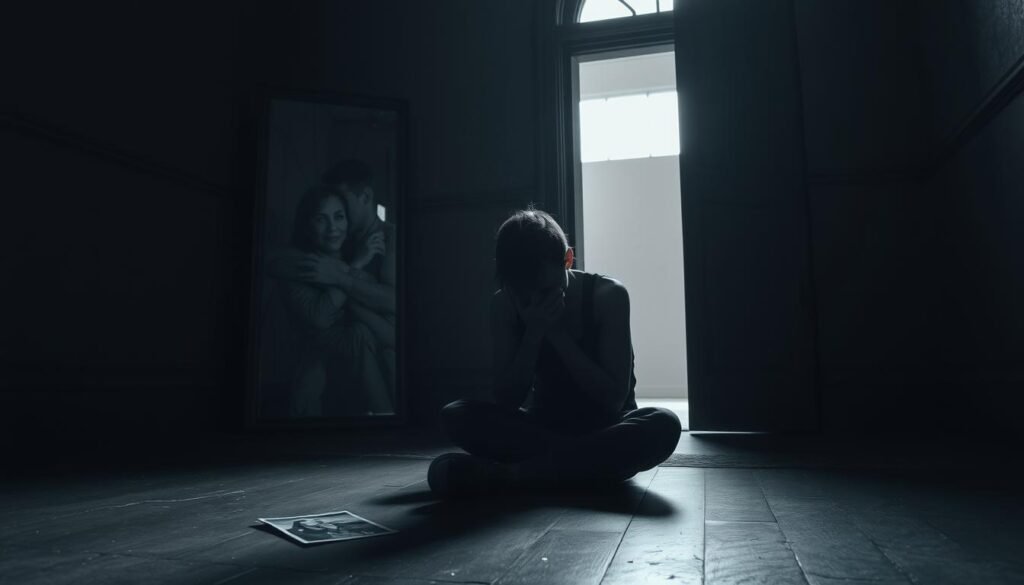About 7% of adults deal with separation anxiety in relationships. This condition affects romantic, platonic, and family ties. It turns love and attachment into fear and distress when away from loved ones. This makes it hard for many people.
We will look into separation anxiety deeply, understanding what it is, its causes, and its effects on us. Learning about this can help us manage fears and build strong, healthy relationships. Knowing why we feel this way is key to overcoming fear and growing emotionally stronger.
Key Takeaways
- Separation anxiety can occur across many relationship types, influencing mental and emotional health.
- There are four attachment styles that deeply impact how individuals experience separation anxiety.
- Cognitive Behavioral Therapy (CBT) is an effective treatment for managing separation anxiety.
- Environmental and genetic factors play a role in the likelihood of developing separation anxiety.
- Practicing mindfulness and engaging in self-care activities can help alleviate anxiety symptoms.
Understanding Separation Anxiety in Relationships
Separation anxiety can deeply affect relationships. It’s important to know what it means and its effects. This is true for those dealing with separation anxiety disorder and their partners. The disorder can cause a lot of insecurity and distress in relationships.
Definition and Overview
Usually, we think of separation anxiety in kids who fear being away from their parents. But, adults can feel it too. This is more likely in those who’ve had tough experiences like loss. Adults might feel very anxious or panicked when away from their loved ones due to a fear of being left.
The Impact of Separation Anxiety
This disorder can make daily life hard, making people need constant reassurance from their partners. Such neediness can strain relationships. It often leaves both partners feeling powerless. If a loved one gets sick or if there’s a big life change like a divorce, it can make things worse. Support and understanding are key to dealing with these issues.
| Factors Contributing to Separation Anxiety | Examples |
|---|---|
| Childhood Relationships | Anxious attachment styles formed in early life |
| Traumatic Events | Bereavement or experiences of loss |
| Major Life Changes | Divorce, relocation, or starting school |
| Constant Reassurance Needs | Frequent demands for affirmation from partners |
Common Causes of Separation Anxiety
Separation anxiety is complex. Factors from childhood can deeply impact one’s emotions. This affects how people form attachments and deal with relationships as adults. Understanding these aspects is crucial to recognizing why some struggle in relationships.
Childhood Experiences and Attachment Styles
Attachment styles are shaped early on. Experiences like childhood trauma or losing a parent can create an anxious attachment style. This leads to fears of being separated as adults, affecting relationships.
People may worry when loved ones aren’t around. They can find it hard to do things without reassurance from those they’re close to. Addressing these childhood factors is key for better adult interactions.
Genetic and Environmental Factors
Genetics and the environment play big roles too. If anxiety runs in the family, a person might be more likely to have separation anxiety. Chaotic homes or ongoing family conflicts heighten anxiety symptoms.
Adults with separation anxiety often face difficulties in romantic relationships. Their attachment styles are influenced by their upbringing and past emotional experiences.
| Factor | Description | Example |
|---|---|---|
| Childhood Trauma | Adverse experiences in early life that affect emotional development | Parental loss leading to anxious attachment |
| Anxious Attachment | A style of attachment characterized by fear of abandonment | Difficulty being alone or away from partners |
| Genetic Factors | Inherited predispositions to anxiety disorders | Family history of anxiety issues |
| Environmental Influences | External conditions impacting psychological well-being | Chaotic home life contributing to anxiety |

Dealing with separation anxiety starts by understanding its roots. Therapy can help change attachment styles for healthier relationships. For more tips on managing separation anxiety, check out this useful resource.
Signs and Symptoms of Separation Anxiety
Knowing how separation anxiety shows up is key to understanding its effects. People dealing with it might show different signs. These can be emotional, physical, or how someone acts, showing they’re struggling.
Emotional Signs
Feeling scared of being left alone is common. This fear can make someone worry a lot about their loved one when they’re not together. They might keep thinking they will lose this person, which makes them very anxious.
Physical Symptoms
Physical signs of anxiety can also appear. Someone might have a fast heartbeat, feel tingling, or be uneasy. These symptoms make the anxiety worse, making it hard to stay calm or focus.
Behavioral Patterns
How someone acts can show they have separation anxiety too. They might get very clingy, looking for comfort from their partner often. Feeling jealous over not being included in outings can happen too. These actions usually come from not feeling sure about trust, adding more stress to relationships.

How Fear of Abandonment Can Trigger Separation Anxiety
The fear of abandonment is a big trigger for separation anxiety. It comes from past issues and feeling insecure in relationships. People who are afraid of being left can worry a lot about losing their partners. This leads to a cycle of anxiety and upset feelings. It’s important to understand this to make relationships better.
The Role of Insecurity in Relationships
Insecurity can make the fear of abandonment worse. For example, someone very insecure might always ask their partner if they are good enough. This behavior can make the relationship hard. It can lead to more tension and anxiety. It’s key to face these insecurities to stop this cycle.
Understanding Attachment Issues
Attachment theory shows how early bonds affect adult relationships. People with secure attachments do well in relationships. But those with anxious or avoidant styles face more problems. Anxious people may fear their partner will leave.
Avoidant people may keep their partners at a distance to avoid getting hurt. Learning about attachment issues is the first step to better relationships and emotional health.

Coping Strategies for Separation Anxiety in Relationships
Managing separation anxiety in relationships means getting to know your own feelings. It is a journey that starts with recognizing the signs and learning to be okay with your feelings. When individuals acknowledge their emotions, they lay the groundwork for coping strategies. These strategies help reduce the impact of separation anxiety on their relationships.
Admitting and Accepting Your Feelings
Dealing with separation anxiety requires being open, which can be tough. Accepting your feelings without judging yourself leads to self-acceptance. This means being kind to yourself. Writing in a journal is a great way to handle this. It lets you think about what triggers your feelings and helps you understand them. Writing helps make these feelings normal, leading to a kinder self-talk.
Seeking Reassurance and Building Trust
Seeking comfort from your partner during separations can really help trust grow. Talking about your fears and worries makes the bond stronger. Couples can come up with ways to keep in touch that make both feel secure, even when apart. Working on coping strategies together deepens the connection. It supports both in handling their feelings and experiences as a team.
Developing Healthy Communication Skills
Good communication is key in any relationship, especially when dealing with anxiety. It’s important to listen to each other and validate feelings without rushing to judge. Skills in solving disagreements are crucial for a supportive environment. Both can share their thoughts openly. By using methods from Cognitive Behavioral Therapy, people can get better at communicating. This improves how they get along.
Using these coping methods daily can make separation anxiety easier to handle. It also leads to growth in how you see yourself and in the trust within the relationship. Knowing that anxiety shows up differently for everyone highlights the importance of customized approaches. This makes each relationship special.
Emotional Dependency and Its Relation to Separation Anxiety
Emotional dependency and separation anxiety often mix, making relationships complicated. Many feel the need to be constantly reassured by their partner. It’s important to know the difference between a healthy bond and emotional dependency.
The Fine Line Between Clinginess and Care
Clinginess may come from past traumas or issues with attachment. Those who are emotionally dependent fear being apart from their partner. They seek comfort in their partner’s constant support. It’s key to understand when support becomes overbearing. Finding this balance can make relationships healthier.
Recognizing Codependency Dynamics
Codependency occurs when one relies too much on their partner for emotional well-being, ignoring personal needs. This often leads to feeling empty, which is common in some personality disorders. Acknowledging codependency is the first step to improvement. Replacing negative thoughts with kindness towards oneself can foster better relationship patterns.
| Aspect | Emotional Dependency | Healthy Attachment |
|---|---|---|
| Source of Validation | Constant need for reassurance | Internal self-worth |
| Fear of Separation | High, leads to anxiety | Low, comfortable with independence |
| Relationship Dynamics | Imbalanced, one-sided | Mutual support and care |
| Emotional Responses | Panic, anxiety, jealousy | Security and trust |
Effects of Jealousy in Relationships
Jealousy in relationships can stir up lots of emotions. It makes feelings of possessiveness stronger and can cause emotional ups and downs. Knowing how jealousy affects separation anxiety is key to making relationships healthier.
How Jealousy Fuels Separation Anxiety
Studies show jealousy can make love and attachment grow stronger. But, it also brings out strong emotions and anxiety, especially when partners are apart. People may start to have negative thoughts. They might fear losing their partner or feel they are not enough.
This struggle can lead to actions like texting or calling a lot out of insecurity. Jealousy mixed with anxiety can push partners apart. It can spark arguments and make partners defensive.
Breaking the Cycle of Possessiveness
To move past possessiveness, partners need to face the insecurities behind their jealousy. Having open talks about jealousy helps in identifying and changing bad habits. Using self-care and starting calming rituals can lower anxiety in the relationship.
Building trust and understanding with each other leads to a closer bond. It helps partners leave behind the stress and move towards a stable and healthy relationship.
| Consequences of Unhealthy Jealousy | Positive Prospective |
|---|---|
| Loss of trust between partners | Correlation with increased love for one’s partner |
| Increased arguments | Can contribute to stability in the partnership |
| Decreased intimacy and connection | Stronger feelings of love |
| Feelings of defensiveness | Opportunity for open communication |
| Worry and anxiety among partners | Can lead to personal growth if addressed |
Personal Growth During Times of Separation
Separation can feel scary. It often brings anxiety and loneliness. But, it’s also a chance for growth and reflection. Alone time can be seen in a positive light. It offers moments for self-discovery that are actually good. This view can lead people to do things that make them happy and improve their well-being.
Redefining Alone Time Positively
Alone time can cause distress, but it also encourages enriching experiences. When we welcome solitude, we find space for new hobbies or meditation. These activities are ways to care for ourselves. They also ease separation anxiety symptoms like headaches and insomnia.
Engaging in Self-Care Activities
Making routines and planning fun activities can help during separations. Prioritizing self-care builds a supportive environment for personal growth. It can make relationships stronger too. Both partners have room to grow and improve their bond. For more tips on handling separation anxiety, check out this helpful resource.